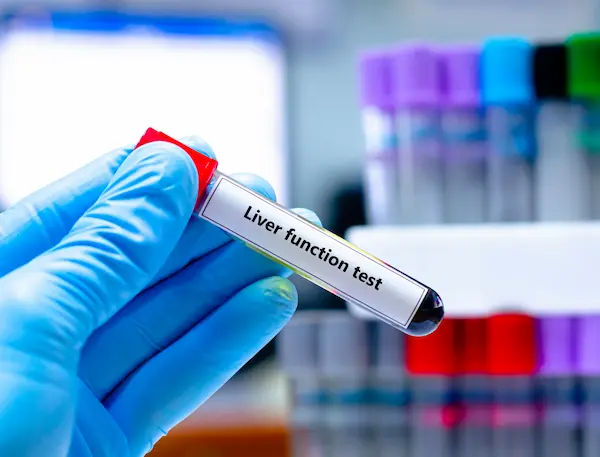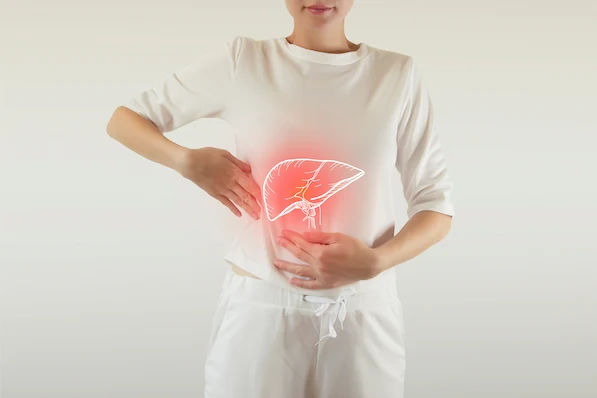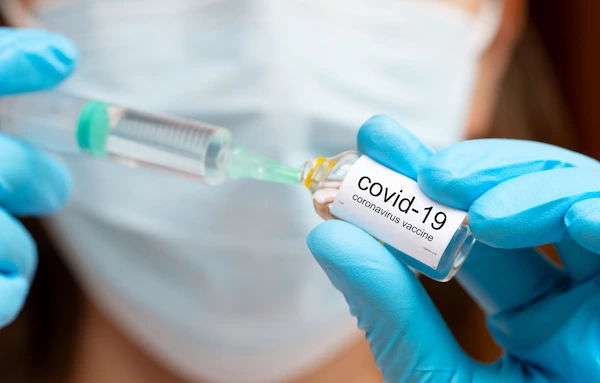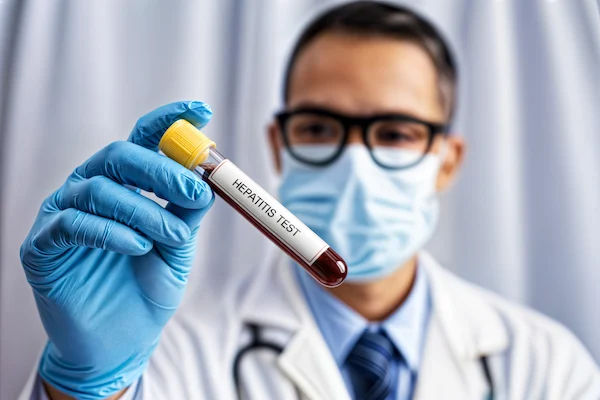Your Complete Guide to Liver Function Tests
Know about the liver function, why it is necessary, components of liver panel, how to prepare for the test and interpretation of results and more.

Written by Dr. Siri Nallapu
Reviewed by Dr. D Bhanu Prakash MBBS, AFIH, Advanced certificate in critical care medicine, Fellowship in critical care medicine
Last updated on 8th Sep, 2025
.webp?tr=q-80,f-webp,w-350,dpr-2,c-at_max 700w)
Introduction
Your liver is your body's unsung hero, a powerhouse organ performing over 500 vital functions, from filtering toxins to aiding digestion. But how do you know if it's working properly? This is where a liver function test (LFT) comes in. If your doctor has recommended this panel of blood tests, or if you're simply health-conscious, understanding what these tests mean is crucial for taking control of your well-being. This guide will demystify every aspect of the liver function test, breaking down the complex medical jargon into clear, actionable information.
What is a Liver Function Test?
A liver function test is not a single test but a group of blood tests that provide a snapshot of your liver's health. Think of it as a dashboard with multiple warning lights; each test measures a different enzyme, protein, or substance produced or processed by the liver.
Doctors use this panel to:
- Screen for liver infections, such as hepatitis.
- Monitor the progression of a disease, like viral or alcoholic hepatitis, and determine how well a treatment is working.
- Measure the severity of a disease, particularly scarring of the liver (cirrhosis).
- Monitor potential side effects of certain medications known to affect the liver.
Contrary to the name, a standard LFT can't always definitively diagnose a specific condition on its own. Instead, it serves as a powerful first step, flagging potential issues that may require further investigation through imaging or a liver biopsy.
Consult a Liver specialist for Personalised Advice
Why Would You Need a Liver Function Test?
Your doctor might order an LFT for various reasons, ranging from routine screening to investigating specific symptoms.
Routine Health Screening
As part of a standard annual physical exam, even if you have no symptoms.
Investigating Symptoms
If you are experiencing signs of potential liver distress, such as:
- Jaundice (yellowing of skin and eyes)
- Dark urine or pale stools
- Nausea, vomiting, or diarrhea
- Abdominal pain and swelling
- Unexplained fatigue and weakness
- Loss of appetite
Monitoring an Existing Condition
If you have already been diagnosed with a liver disease like hepatitis, fatty liver disease, or cirrhosis, regular LFTs help track the disease's activity and your response to treatment.
Medication Monitoring
Certain medications, including statins (for cholesterol), some anticonvulsants, and even over-the-counter drugs like acetaminophen (Tylenol), can affect liver enzymes. Doctors use LFTs to ensure these medications are not causing harm.
Get Your Health Assessed
The Liver Function Test Panel: Breaking Down the Components
A standard LFT panel typically includes several key measurements. Understanding what each one represents is the first step to understanding your results.
1. Alanine Transaminase (ALT)
What it is: An enzyme found primarily in the liver.
Why it's measured: ALT is released into the bloodstream when liver cells are injured or inflamed. It is one of the most specific markers for liver damage. Elevated ALT levels are a strong indicator of issues like hepatitis, non-alcoholic fatty liver disease (NAFLD), or drug-induced liver injury.
2. Aspartate Transaminase (AST)
What it is: An enzyme found in the liver, heart, muscles, and kidneys.
Why it's measured: Like ALT, AST rises with liver damage. However, because it's not exclusive to the liver, a high AST level alone is less specific. Doctors often look at the ALT/AST ratio to help pinpoint the cause. For instance, a ratio greater than 2:1 is often seen in alcoholic liver disease.
3. Alkaline Phosphatase (ALP)
What it is: An enzyme found in the liver's bile ducts and in bones.
Why it's measured: High levels of ALP can indicate a blockage in the bile ducts (cholestasis), such as from a gallstone or a tumor. Because it's also in bones, elevated ALP can be normal in growing children or may indicate a bone disorder.
4. Gamma-Glutamyl Transferase (GGT)
What it is: An enzyme found in the liver, bile ducts, and pancreas.
Why it's measured: This is a very sensitive marker for bile duct problems. It is often used to confirm that a high ALP level is due to liver disease and not a bone issue. GGT is also highly elevated by alcohol consumption.
5. Bilirubin
What it is: A yellow pigment produced when red blood cells are broken down. The liver processes and excretes it in bile.
Why it's measured: High bilirubin levels cause jaundice. It helps determine how well the liver is processing waste. Elevated levels can indicate liver dysfunction, bile duct obstruction, or conditions causing increased red blood cell breakdown (hemolysis).
6. Albumin
What it is: The main protein made by the liver. It keeps fluid from leaking out of blood vessels and carries hormones, vitamins, and enzymes through the body.
Why it's measured: Unlike the enzymes that show acute damage, albumin reflects the liver's synthetic function over a longer period. Low albumin levels can be a sign of chronic liver disease, such as cirrhosis, where the liver can no longer produce this vital protein effectively.
7. Total Protein
What it is: This measures the total amount of two main proteins in your blood: albumin and globulins.
Why it's measured: It provides a general overview of your nutritional status and liver function, though it's less specific than albumin alone.
How to Prepare for Your Liver Blood Test?
Preparation for an LFT is usually straightforward but crucial for accurate results.
- Fasting: Your doctor may ask you to fast (not eat or drink anything except water) for 8-12 hours before the test. This is because recent food intake can temporarily elevate certain liver enzyme levels.
- Medications: Inform your doctor about all prescription drugs, over-the-counter medications, and supplements you are taking. They will advise you on whether to temporarily stop any of them.
- Activity: Avoid strenuous exercise immediately before the test, as it can also affect some enzyme levels.
The test itself is a simple blood draw from a vein in your arm, taking only a few minutes.
Interpreting Your Liver Function Test Results
It's important to never self-diagnose based on your LFT report. Always discuss your results with your doctor, who will interpret them in the context of your overall health, symptoms, and medical history.
Understanding Normal Ranges
Lab results always come with a "reference range." This is the range of values that labs consider normal for a healthy population. These ranges can vary slightly between different laboratories. Your doctor will look for values that fall outside this range.
Common Patterns and What They Might Suggest
Doctors look at the entire pattern of results, not just individual numbers.
- Elevated ALT and AST: Suggests hepatocellular injury (damage to liver cells). Common causes include viral hepatitis, NAFLD, alcohol use, or medication side effects.
- Elevated ALP and GGT: Suggests cholestasis (a blockage or problem with bile flow). Common causes include gallstones, bile duct strictures, or certain medications.
- Elevated Bilirubin: Indicates a problem with the liver's processing of waste, often seen with jaundice.
- Low Albumin: Suggests chronic liver disease where the liver's protein-making ability is compromised, such as in advanced cirrhosis.
What Can Cause Abnormal Liver Enzymes?
Abnormal results don't always mean you have a serious, chronic liver condition. Many temporary factors can cause a mild, transient elevation.
Common and Often Reversible Causes
It includes:
- Non-Alcoholic Fatty Liver Disease (NAFLD): The most common cause of mildly elevated ALT/AST in developed countries, strongly linked to obesity and metabolic syndrome.
- Alcohol Consumption: Even short-term binge drinking can significantly raise AST, ALT, and GGT.
- Medications: Common culprits include acetaminophen (especially in high doses), nonsteroidal anti-inflammatory drugs (NSAIDs), certain antibiotics, and statins.
- Viral Infections: Like infectious mononucleosis (mono) or cytomegalovirus (CMV).
More Serious Liver Conditions
It includes:
- Viral Hepatitis (B and C): Chronic infections that cause ongoing inflammation.
- Alcoholic Liver Disease: Caused by long-term, excessive alcohol consumption.
- Autoimmune Hepatitis: Where the body's immune system attacks liver cells.
- Cirrhosis: Late-stage scarring of the liver from long-term damage.
- Liver Cancer or Bile Duct Cancer.
Next Steps After an Abnormal Liver Test
An abnormal result is a signal, not a sentence. Your doctor will guide you through the process.
1. Don't Panic: Mild elevations are common and often temporary.
2. Follow-up: Your doctor will likely recommend a repeat test to confirm the results and see if the pattern persists.
3. Further Diagnostic Testing: This may include:
- Viral Hepatitis Serology: Blood tests to check for hepatitis A, B, or C.
- Imaging: An ultrasound, CT scan, or MRI to get a visual of the liver's structure and look for fat, tumours, or duct blockages.
- Elastography: A special ultrasound that measures liver stiffness, a proxy for scarring (fibrosis).
- Liver Biopsy: In some cases, a small sample of liver tissue may be needed for a definitive diagnosis.
Conclusion
Understanding your liver function test empowers you to be an active participant in your healthcare journey. While the terminology can seem daunting at first, this guide has equipped you with the knowledge to have an informed conversation with your doctor. Remember, the goal of an LFT is proactive to catch potential problems early when they are most treatable. Use the reports to support your liver through healthy lifestyle choices: maintaining a balanced diet, exercising regularly, drinking alcohol in moderation (if at all), and using medications only as directed.
Consult a Liver specialist for Personalised Advice
Consult a Liver specialist for Personalised Advice
Dr. Ambuj Kumar
Pulmonology Respiratory Medicine Specialist
10 Years • MBBS, MD (Pulmonary Medicine)
New Delhi
Smriti Gynaecology and Lung Centre, New Delhi

Dr. Tamal Bhattacharyya
Pulmonology Respiratory Medicine Specialist
8 Years • MBBS, MD (Respiratory Medicine)
Kolkata
MCR SUPER SPECIALITY POLY CLINIC & PATHOLOGY, Kolkata

Dr. Moumita Chatterjee
Pulmonology Respiratory Medicine Specialist
17 Years • MBBS, MD Pulomonary Medicine
Kolkata
Dr. Moumita Chatterjee's Clinic., Kolkata

Dr. P Sravani
Pulmonology Respiratory Medicine Specialist
3 Years • MBBS, MD
Visakhapatnam
Apollo Clinic Vizag, Visakhapatnam

Dr Rakesh Bilagi
Pulmonology Respiratory Medicine Specialist
10 Years • MBBS MD PULMONOLOGIST
Bengaluru
Apollo Clinic, JP nagar, Bengaluru
Consult a Liver specialist for Personalised Advice
Dr. Ambuj Kumar
Pulmonology Respiratory Medicine Specialist
10 Years • MBBS, MD (Pulmonary Medicine)
New Delhi
Smriti Gynaecology and Lung Centre, New Delhi

Dr. Tamal Bhattacharyya
Pulmonology Respiratory Medicine Specialist
8 Years • MBBS, MD (Respiratory Medicine)
Kolkata
MCR SUPER SPECIALITY POLY CLINIC & PATHOLOGY, Kolkata

Dr. Moumita Chatterjee
Pulmonology Respiratory Medicine Specialist
17 Years • MBBS, MD Pulomonary Medicine
Kolkata
Dr. Moumita Chatterjee's Clinic., Kolkata

Dr. P Sravani
Pulmonology Respiratory Medicine Specialist
3 Years • MBBS, MD
Visakhapatnam
Apollo Clinic Vizag, Visakhapatnam

Dr Rakesh Bilagi
Pulmonology Respiratory Medicine Specialist
10 Years • MBBS MD PULMONOLOGIST
Bengaluru
Apollo Clinic, JP nagar, Bengaluru





